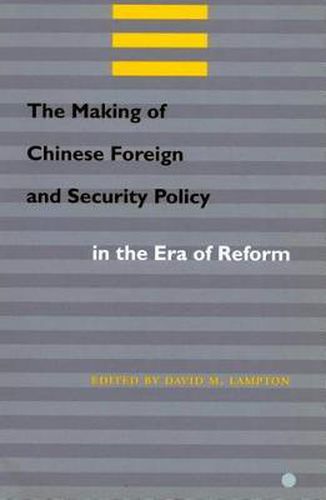Readings Newsletter
Become a Readings Member to make your shopping experience even easier.
Sign in or sign up for free!
You’re not far away from qualifying for FREE standard shipping within Australia
You’ve qualified for FREE standard shipping within Australia
The cart is loading…






This volume provides a look at the changes in the way Chinese foreign and security policy is made during the reform era, and the implications of those changes for China’s future behaviour on the international stage. Bringing together the contributions of more than a dozen scholars who undertook extensive field research in the People s Republic of China, South Korea, and Taiwan, the book is the most comprehensive, in-depth, and rigorous account of how Chinese foreign and security policy is formulated and implemented. Since the reform era began in the late 1970s, a new and ever-changing mix of forces has been reshaping Chinese foreign and national security policy-making institutions and processes. This volume examines those forces: bureaucratic politics and evolving organizations, changing elite views and skills, an altered domestic agenda, increasingly diverse social forces and public opinion, and the growing complexity of the international system itself, including globalization and multilateral regimes. The analysis goes one step further to look at specific foreign and security policy issues and relationships, including case studies dealing with Korea, Taiwan, the World Trade Organization, and arms control.
$9.00 standard shipping within Australia
FREE standard shipping within Australia for orders over $100.00
Express & International shipping calculated at checkout
This volume provides a look at the changes in the way Chinese foreign and security policy is made during the reform era, and the implications of those changes for China’s future behaviour on the international stage. Bringing together the contributions of more than a dozen scholars who undertook extensive field research in the People s Republic of China, South Korea, and Taiwan, the book is the most comprehensive, in-depth, and rigorous account of how Chinese foreign and security policy is formulated and implemented. Since the reform era began in the late 1970s, a new and ever-changing mix of forces has been reshaping Chinese foreign and national security policy-making institutions and processes. This volume examines those forces: bureaucratic politics and evolving organizations, changing elite views and skills, an altered domestic agenda, increasingly diverse social forces and public opinion, and the growing complexity of the international system itself, including globalization and multilateral regimes. The analysis goes one step further to look at specific foreign and security policy issues and relationships, including case studies dealing with Korea, Taiwan, the World Trade Organization, and arms control.